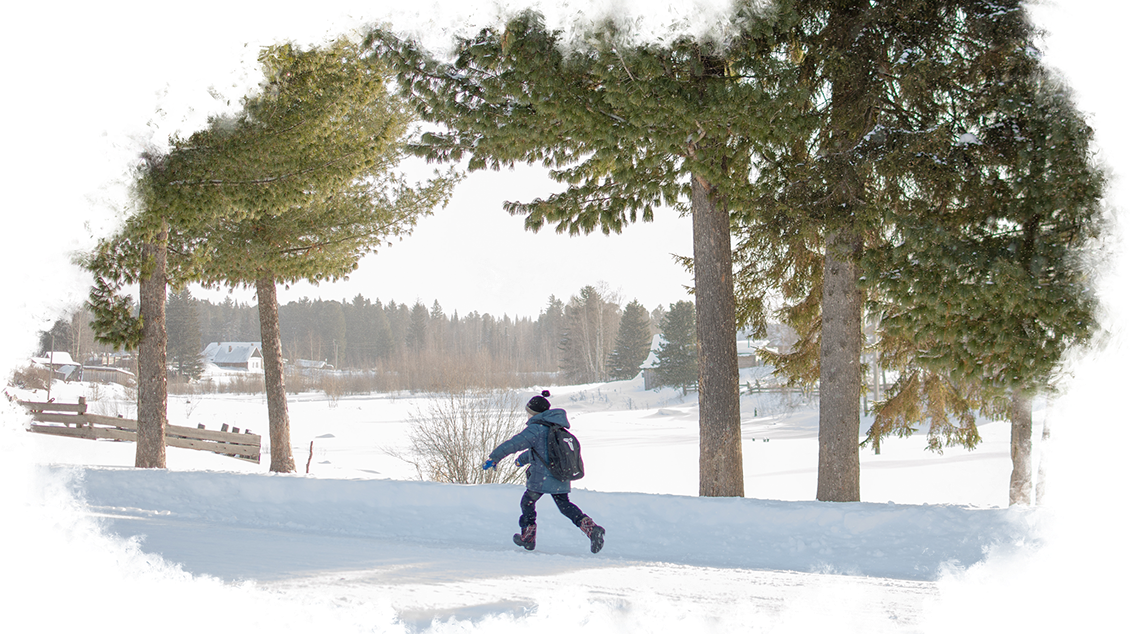
Post Selkups
Six schoolchildren of Selkup origin speak about themselves, their plans for the future, and Selkup culture
en
The Selkups:
save as...
About
the Project
CONTEXT
TRADITIONS
TROUBLES
text, photo:
Taisia Shchelkanova
“You are a representative of the Russian indigenous peoples, you have
to be protected”, Natasha’s classmates joke against her.
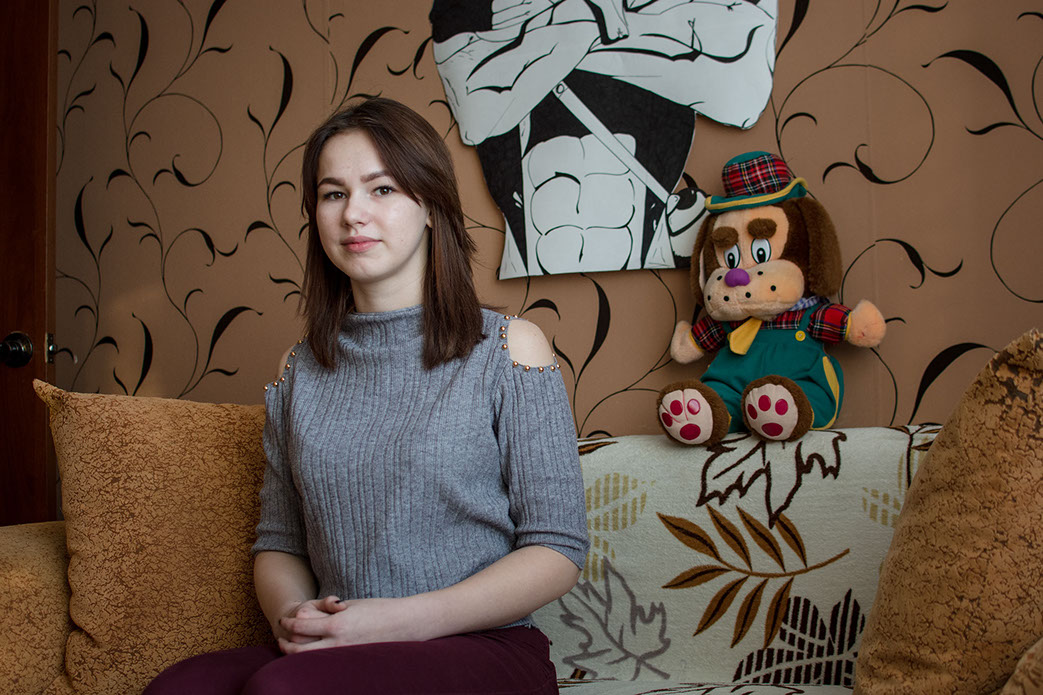
Natasha wants to leave Parabel’ as soon as possible.
Natal’ya Anufrienko, 17 y.o.
Paternal grandmother was Selkup
Has Selkup identity card
“I am Russian, well, not really as I have Selkups in my family, but I speak Russian.
I have a book of fairy-tales in the Selkup language; my grandmother used to read it to me in my childhood. Now I don’t really know where it is, probably, in the pastry.
I don’t need it because I don’t know the Selkup language. If I didn’t have to prepare for exams and think about which university to enter, I would probably learn some words. I wouldn’t study the language thoroughly, though, because I can’t even learn English. Even if I learned Selkup, what do I need it for? Selkup is just the language of my ancestors, I don’t need it. The Selkups are small-numbered peoples and it would only be possible to speak it only in a small group of people. Russian is more important because there are more Russians.
But still, Selkup is a part of my family history. It is interesting.
My father and I look like the Selkups. I have dark hair and my eyes are narrower compared with other people. That’s why sometimes my classmates laugh out loud at me.
When I was at primary school, everybody knew that I’m half Selkup and told nothing. Now I hear a lot of jokes. For example, in the application form for the State Exam, students have to mark a refugee status and my classmates asked me why I didn’t write that I was a refugee from Selkupia. However, I more often hear kind jokes, for example, "Let’s protect Natasha, she is a representative of the Russian indigenous peoples".
People say that my brother, who is 10, is more like Russian. He is similar to the mother. Fair hair, blue eyes — lazy as the father.
Father constantly lies on the sofa and does nothing. Probably, it is the truth that the Selkups are lazy and hate cleaning. Mom always says "You have to overcome this feature, so go and wash the dishes". She also makes me cleaning up.
There is a row of small icons on the shelf over the computer in Natasha’s and her brother’s room.
3 649 Selkups
live in Russia according
to the 2010 census. 1787
of them live in the Tomsk Oblast.
At the festival, everything looks very realistic – those tambourines made from leather, dances, songs, and rituals. I don’t know if it’s true or not, but people say that the day before the festival a shaman comes to lake Os’kino and casts good weather
My mom goes to church every Sunday and also invites dad, but he refuses. He says he is a pagan by nature, but he wears a crucifix.
My dad with friends prefers fishing rather than hunting in spare time. He has special privileges to fish sterlet. I myself went fishing only once – when I was little, my dad gave me a fishing rod to hold it in a river.
When the father brings fish and animals, I feel pity for them; sometimes I can’t even eat them, but more often, I eat when my mom cooks it because, well, nothing can be changed yet. I’m not a vegetarian at all; moreover, I’ve never seen a vegetarian.
Sometimes, my mom makes ukha (traditional Russian fish soup — translator’s note) from fish. I can’t say if it’s really Selkup as at The Northern Etudes because I’ve never had time to taste it The Northern Etudes festival.
At the festival, everything looks very realistic – those tambourines made from leather, dances, songs, and rituals. I don’t know if it’s true or not, but people say that the day before the festival a shaman comes to lake Os’kino and casts good weather. And really, when it pours with rain during the whole week, we think that the date will be moved. But it always happens the day it has been planned. It’s always hot, even if the day before is cold and rainy. People say it’s due to shaman’s work. However, I’ve never seen him.
Probably, I won’t get an opportunity to taste the ukha again, because I’m going to Tomsk to enter a university, probably a pedagogical one.
I’m exactly Russian, but with the Selkup blood. If you compare me and somebody who simply knows the language, then even they are more Selkup than me. If one knows the traditions and dishes and they are present in their lives, this person is Selkup.
I would tell my children that their ancestors were Selkups. If a child were interested in the Selkup language and culture, I would let them study it. In my childhood, I was given a list of hobby groups and was told to choose anything I liked. I prefer this way for my children too”.
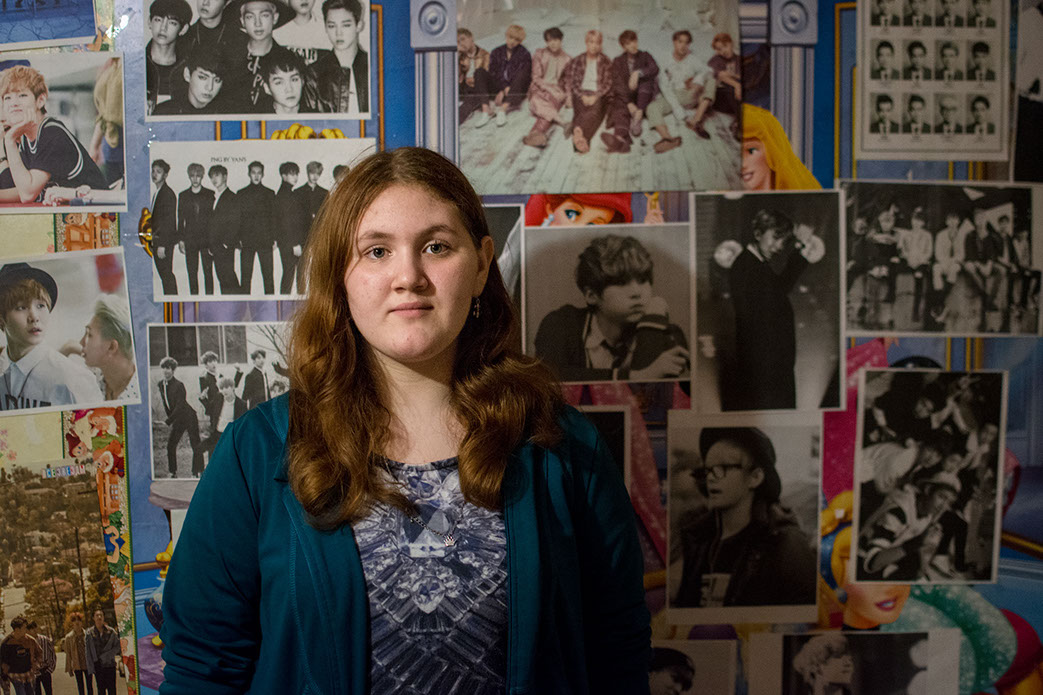
In Lera's room, all the walls are papered with posters with Korean singers in them.
Valeria Tuzakova, 12 y.o.
Paternal great-grandfather was Selkup
Doesn’t have Selkup identity card
“I have been singing Selkup songs in our group for several years. Every summer, we perform at the Northern Etudes festival.
Most of us have Selkup roots, and I think they don't need to learn the language hard, in any case, they know at least several words. But also, there are non-Selkups, for example, my mom.
I want people to know the way my ancestors lived. I don't know why they should know it but personally, I believe it is important — especially for those children who have the Selkup origin. That’s partly why I perform.
However, a holiday should stay a holiday; it should be not for you personally but for all the people around. Though it seems to me that only it is only adults who usually come to watch the performers, to listen to the songs and stories about the traditions of the peoples of the North.
My classmates aren't interested in it. They watch some dances and listen to some songs, but then they hurry to jump on trampolines as in an amusement park. Perhaps, they prefer it more.
Though personally, I don’t know if I did anything to preserve the Selkup culture. If any other people with Selkup roots were found, with whom it would be possible to go and look for other Selkups and tell other people about the Selkups, then I may do it.
Every summer our whole family goes fishing. My father has taught me how to fish since I was 5 but he doesn't take me for hunting — he just says "no".
I’ve never heard that Selkup women were like Amazons: went hunting and fishing themselves. I don’t think it could be true, my grandmother was absolutely different.
Now people speak Russian more. Selkup seems to be a lost language. Maybe one or two people know about it
Irina Anatolyevna (Korobeynikova, the head of Parabel' department of Russian Association of the Indigenous Peoples of the North Kolta-kup, editor’s note) invited me in her group of learning the Selkup language but I'm not going to go there because I won't need Selkup in the future.
Now people speak Russian more. Selkup seems to be a lost language. Maybe one or two people know about it.
Walls in Lera’s room are papered with posters of Korean singers.
Korean is much more interesting. I’m trying to study it, but not successfully. I have adored K-pop since I was 10. I like watching movies and series in Korean with subtitles; when I listen to them it seems I understand more than I understand singing in Selkup.
My favorite series in Korean is Strong girl Bong-soon. It's about a girl, whose family inherits a superpower on the mother’s side. Because of it, she has some problems in life. She can't restrain her power and ruins everything around. Later, a man helps her with this superpower, she learns how to manage it, they fall in love with each other, celebrate the wedding,
and so on.
I want to become a photographer or a designer; this year I've entered art school to reach this goal. Mom says this is a good hobby but not a job. She also says that she had such acquaintances in Kemerovo and nothing went well for them. But still, I’m going to try”.
K-pop (abbreviation of Korean pop) is a popular musical genre originated from South Korea. It is a mix of electronic music, hip-hop and rhythm and blues.
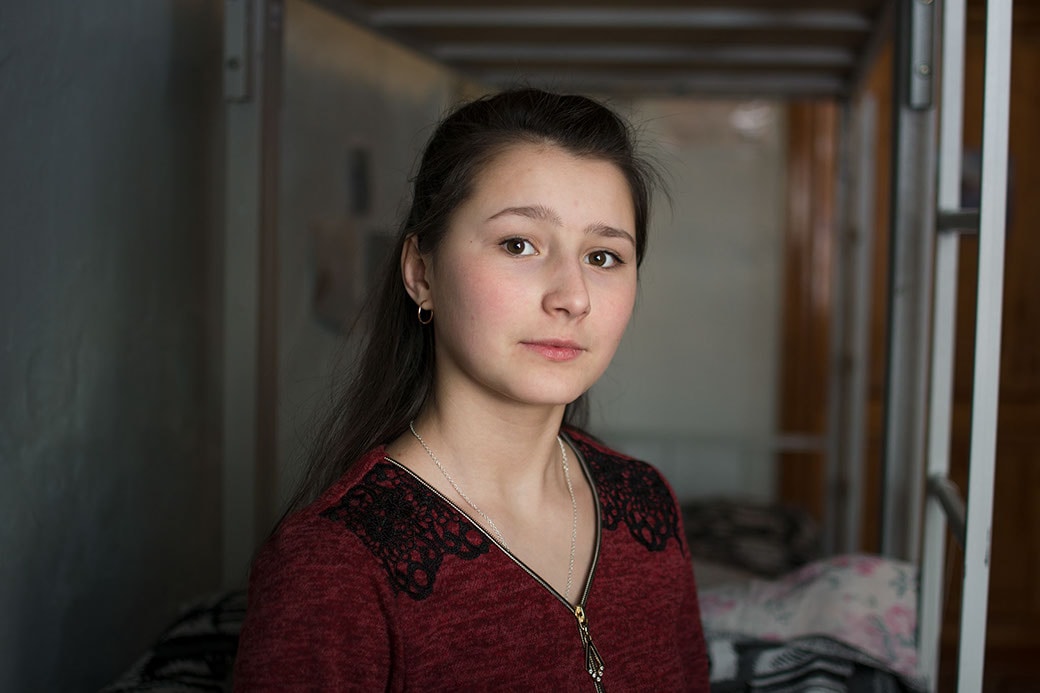
This year Nastia has moved to a boarding school to finish secondary school.
Anastasiya Sereda, 16 y.o.
Maternal grandmother was Selkup
Does not have Selkup identity card
“A couple of years ago, a hobby group Kylyb Bygu, which stand for come together in Selkup, was set up in the village of Nel’mach. There I found out that I was Selkup.
Svetlana Georgievna (Chinina, a primary school teacher, Selkup, was a head of the club of the Selkup culture in the village of Nel’mach — author's note) didn’t tell me about it at once, just in a couple of months. It turned out that previously, our village was also called the yurt of Saispaevy and my maternal ancestors came from there, from the family of Dresvyankiny.
My mother didn’t know that either, perhaps, she wasn’t interested or my grandmother didn’t find time to tell her as she died when my mom was
only 14.
I saw only one old photo of my grandmother. I found nothing Selkup-like in our photo albums.
At the hobby group meetings, Svetlana Georgievna used to teach us how to weave nets, make boxes from birch bark, and bead breastplates. At that moment, it was easy for me; I was told I was good at weaving and embroidering. However, currently, I wouldn’t recall how to do that.
Once, we were even invited to the festival to play a role of Selkups. We wove nets and some people approached us and asked about that; others even told us that we were doing it wrong and showed us the way they supposed it to be right. I do not know whether they were Selkups; just some old men.
Not even Russians but Italians visited our group; they took an interest, and we even danced for them.
Sometimes, in a fit of joy, we just add some of our own movements, and Svetlana Georgievna usually doesn’t mind because it shouldn’t be just Selkup. After all, we are
modern people
We still perform these dances, although the group doesn’t exist anymore. This year, my friends and I have performed at The Northern Etudes, we created the dance ourselves. We chose a Selkup song; we adopt some movements of a video of Parabel’ Selkup dances, but we create others by ourselves trying to reflect the nature. Sometimes, in a fit of joy, we just add some of our own movements, and Svetlana Georgievna usually doesn’t mind because it shouldn’t be just Selkup. After all, we are modern people.
Once at the festival, I even participated in a beauty contest, The Beauty of the North. It is like an ordinary beauty contest but among the Northern peoples. Of course, I didn’t win; however, they printed me in a book and presented me a mug.
In the group, we used to learn the Selkup language, there were books and dictionaries. I even remember something. Samzhepotel’ba is a word I learned from my friend’s Selkup sister. She used to know something in Selkup, but currently, she is busy with her own family. Samzhepotel’ba means a frog is jumping, Kylyb Bygu stands for come together, and Tarot Valiga is a greeting if I’m not mistaken.
I didn’t learn much Selkup and I’m not going to as I suppose it’s no longer necessary. Even my Russian is not so good, I have a B mark for it. Perhaps, for the self-development, I would learn some words and their translation and tell them to my friends — who knows, they might find it interesting. Although, if the Selkup language would become as popular as English, I may take up learning it.
I rarely go to nature. Sometimes, we go to the forest to pick cones and berries, but I do not go far from my parents as I’m really afraid of meeting
a bear.
Thanks to Svetlana Georgievna, the head of our hobby group, they were about to issue a Selkup identity card for me. In the 9th grade, she advised my mother and me to write to Tobol’zhin (at that time, he was the head of Parabel’ branch of the Association of Indigenous Small-Numbered Peoples of the North, Kolta Kup — the author's note) so I would be recognized as Selkup and later I would have a chance to study at the Institute of the Peoples of the North. We submitted documents and since then I have not asked about them. I do not know what has come of it, perhaps, they didn’t give a permission. Recently, I have found out that this institute is in St. Petersburg and even if I got this certificate, I would not leave my home to go that far. Even now, I miss my relatives while I’m in boarding school finishing high school. In Nel’mach, it’s only possible to finish secondary school. I’ll finish the school, then graduate from Tomsk university, and move to Parabel’ or Kolpashevo; I do not want to go any farther.
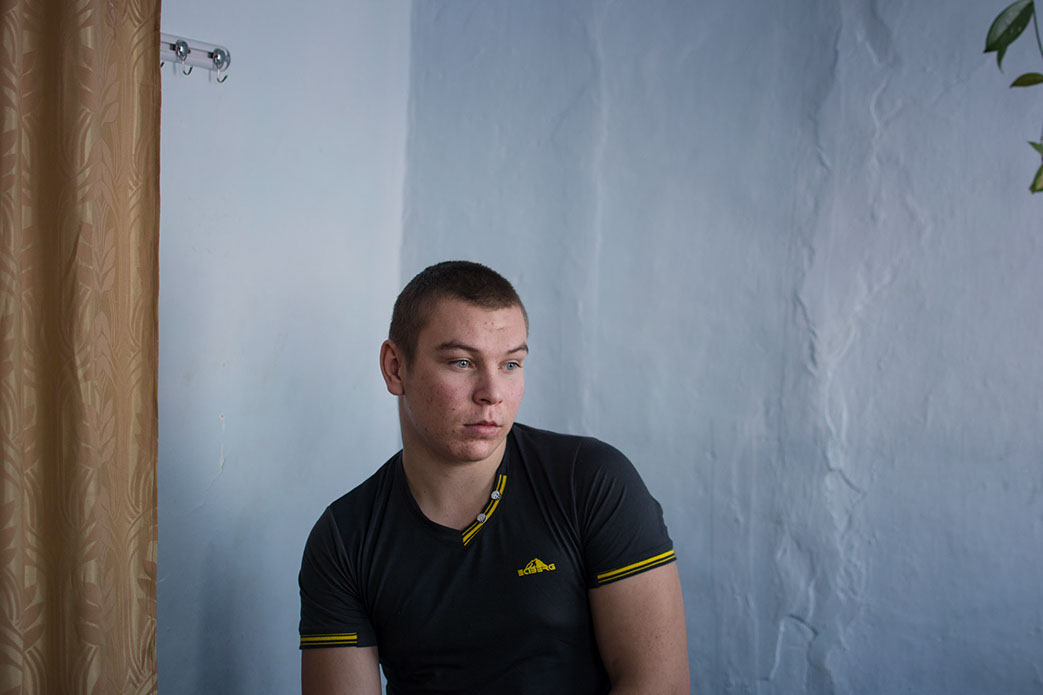
Vasiliy loves the songs of ‘Korol I Shut’, the Russian punk rock band
Vasiliy Luchin, 19 y.o.
His father is Selkup
Has Selkup identity card
Since the childhood, people have called me Ostyak, like my father. Previously, they all were registered as the Ostyaks, nobody called them the Selkups.
My father died when I was about 3 and I do not remember him. My mother told me that he hunted sables and mooses and was a skillful and lucky hunter. But I had to learn everything by myself.
Cartridges have become more expensive now and some time ago I used to hunt more often. Currently, only in the spring or autumn, my friends and I may go shooting ducks. Also, we hunt grouse. We go fishing for our own use.
If I didn’t have the Selkup roots, I wouldn’t be allowed to fish sterlet. I have got the Selkup certificate for this goal, so I have privileges. We, the indigenous peoples, are allowed to fish red salmon, although it’s on the Red List of Threatened Species. Also, we are allowed to go hunting.
However, I go fishing more often, usually using a seine.
Vasya shows me a photo of a fish in the nets in his smartphone.
About three sacks, which is not enough, sometimes you can catch more.
While ribbons for good luck, idols, and stuff are superstition, I think. I was baptized in my childhood, but I don’t believe in God. I’ve got the cross only recently and just for appearance’s sake
Till now, we may fish using a Selkup cage trap. Almost everyone here knows how to make them. The Selkups taught the Russians everything they knew. Nowadays, it is made from wire, and earlier it was made from a special rod, which grows here on swamps. However, nets are usually bought, only a few people weave them, most can’t do it. There are, probably, only two old men here who can.
I learned to ride an oblasok (a Siberian dugout boat — TN) myself; the main idea here is to keep balance. Well, here almost everyone knows how to ride it, there are many fishermen here — especially, in Parabel’ and Prokop, they are regularly flooded. At The Northern Etudes, oblasok races are even held. I was at the festival only in my childhood and I have not participated in the races yet. My Selkup aunt, my father’s sister, took part in oblasok races and even beat men.
My father had a Selkup identity card. He often went to the forest, but he didn’t hunt the bear. He believed that it was the owner of the taiga, so, nope, forbidden. I think that’s right. While ribbons for good luck, idols, and stuff are superstition, I think. I was baptized in my childhood, but I don’t believe in God. I’ve got the cross only recently and just for appearance’s sake. You know, all the baptized wear it and I thought I should wear it as well, so I bought it. This is the third one. I continue losing all of them.
This year, Korobeynikova invited us to learn the Selkup language. I agreed and I’m going to give a try. People say my grandfather knew it, although he didn’t speak it, he could understand it as well as my grandmother. I will know my mother tongue just for myself; though it may be useful and I will teach it to someone. It is unlikely that many people will speak it; there are too few Selkups left”.
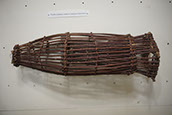
Morda is a fishing tackle-trap, which looks like two cones inserted one into another, woven from rods.
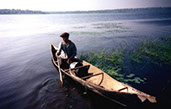
Oblasok is a boat, hollowed out from
a single tree.
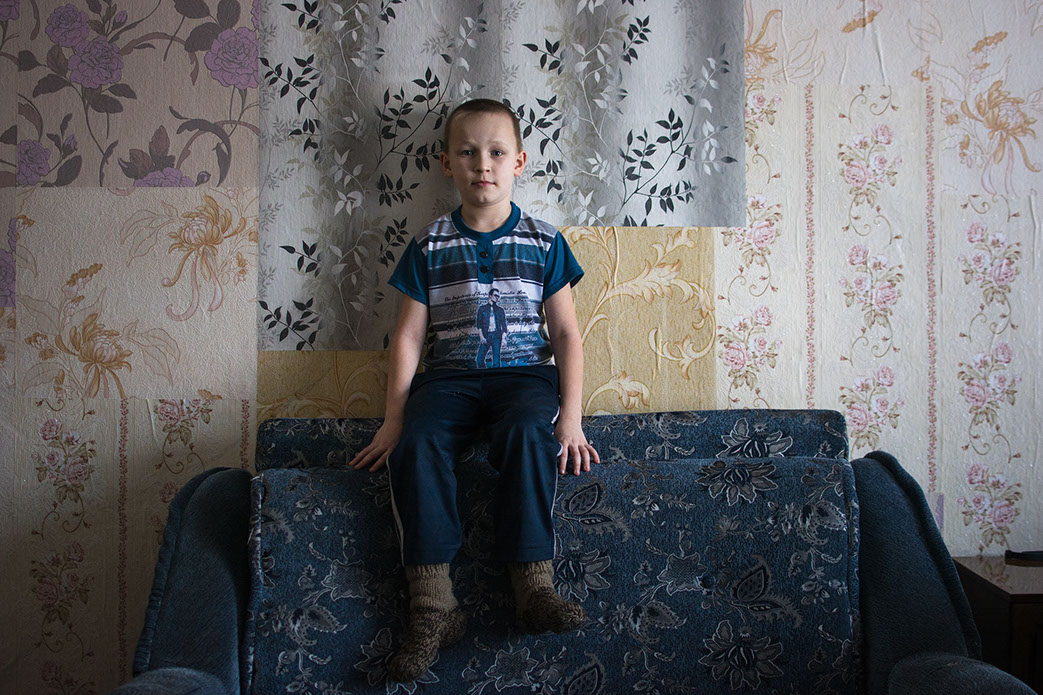
Timofey is the only one of three brothers who has agreed to talk to me
Timofey Rodionov, 8 y.o.
His mother is Selkup
Has Selkup identity card
We sit in the kitchen of a cottage. The eldest son, a teenager, didn’t want to talk about the Selkups, although his mother says he knows a lot and even goes fishing himself. The youngest one is still a kindergartener.
Timofey, a second-grader, has agreed to talk to me. He sits on a stool with his hands between his legs.
— Who was Selkup in your family?
— I don’t know what it is.
His mother helps:
— It’s a nation, your grandma was German. And your mother is?
— I don’t know.
—Your mother is of a Selkup origin.
Timofey says that school is hard for him. Writing words in Russian is hard. During the break, he does not play, just walks around the school. After school, he cleans the house, strolls along the streets, and then does his homework. He plays with Sveta and Stas outdoors. «We just play in the snow».
— Have you ever gone hunting or fishing?
— I’ve gone fishing. And hunting. My father and I were waiting when ducks would come but they didn’t.
— What do you think if there’s a special creature in the woods that helps hunters or bothers them?
— Perhaps, no. It just goes as it goes. Nobody helps a hunter.
— Do you usually catch a lot of fish?
— Nah, few, about five fishes.
— Is it big?
— No, it's small. The only crucian carp and little gobies.
— Do you like fish?
— Nah, it’s not tasty.
— Do you like meat?
— No, I don’t like it either.
— Have you ever ridden the boat?
Timofey is silent. His mom knows better:
— He rode an oblasok (a dug-out Selkup boat — translator's note) when he was very little. Since then – no. Actually, I love oblaski myself, I like fishing and hunting. When the kids were little, my husband and I used to go on an island for a week, where father- and mother-in-law brought us some food later and we stayed there for longer.
— Would you like to ride the boat?
— No.
— Are you afraid of water?
— No, I just don’t want to.
Mother looks at Timofey intently:
— Why don’t you tell how you were killing snakes in the wood?
— Kirill was on his way to visit Zhen'ka and saw a snake, five of them. When they killed one, Dimka and I came to look at it, and there was another one in a wooden log. Then dad came and killed them all.
— Aren't you afraid of them?
— I am.
His mom laughs:
— All of them were standing on the wooden logs.
Timofey loves watching Fixiki (Russian popular cartoon about small creatures that fix devices — TN), wants to be a pastry-cook, and has never been to The Northern Etudes. His mother says it came so because it's too expensive to take three boys to the festival. Children from Zavodskoe are not taken to Lake Os’kino as there are too few of them for a whole school bus and there is no money for it.
— Do you want to study Selkup?
— Noooo!
— I’m learning English. I even know it a little bit already.
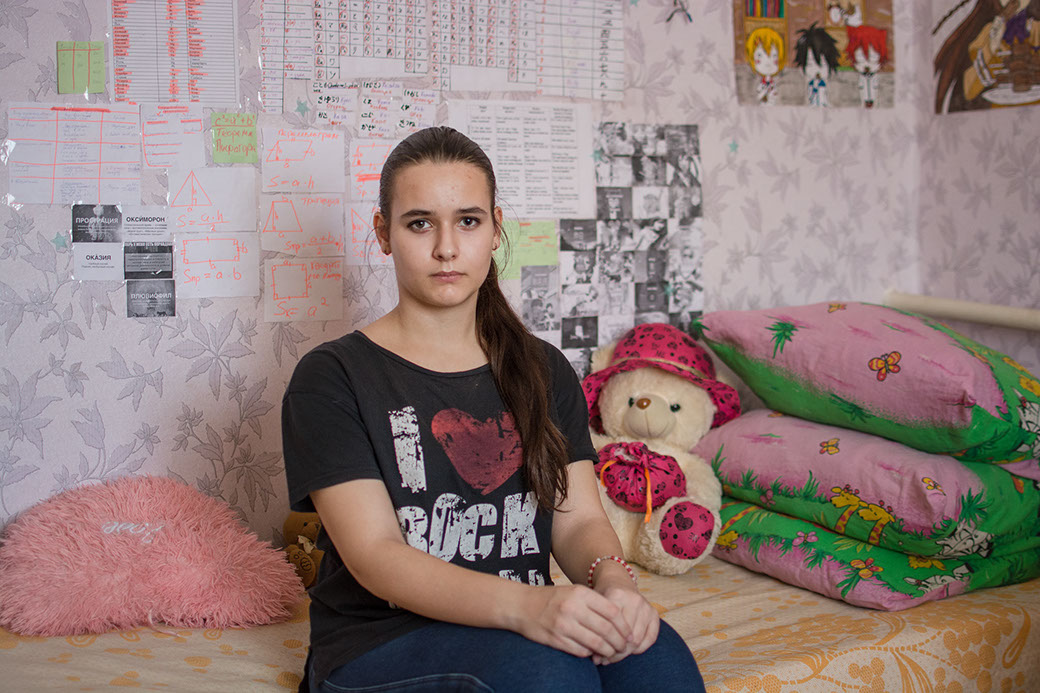
Sasha does not like rock’n’roll but this T-shirt was a present from her mom
Aleksandra Mal'kova, 13 y. o.
Her maternal great-grandfather was Selkup
Does not have Selkup identity card
I didn't know anything about the Selkups before this summer. All this hype started because of The Northern Etudes.
There was an ad in our newspaper; they were searching for participants for The Beauty of the North, which is a beauty contest among the northern peoples at the festival. My granny saw it and asked me "Sasha, will you take part?" I agreed, I liked the idea. At the first meeting, I was said that I looked like Selkup. And then it all began; moreover, it turned out that Mal’kovy is a Selkup surname.
Our youth center helped me prepare for the contest, write about myself as Selkup, and come up with a costume for a performance. I didn't know much about the Selkups and wouldn't get through that myself.
I was the youngest participant. There also were girls from the 11th grade but they weren't Selkup at all. This year there even were foreigners, they liked ukha (Russian traditional fish soup — TN) very much. But I had no time
to try it.
Also, at The Northern Etudes, I tied a ribbon and made a wish. Maybe, it did come true, I don't remember what I wished for.
My grandma and granddad don't like it but say nothing. Grandma has hung an icon in my room.
After New Year, my grandma told me that a Selkup language club had been set up. I decided to join, and now my grandad takes me to Parabel' two times a week. The Selkup language is a little similar to Russian, you can write down words in Russian to remember pronunciation better. Some words are very alike Russian ones, for example, privet (hello — TN) is torowa (it sounds like zdorovo, which is another variant for hello in Russian — TN); such words were adopted from Russian. Other words are not alike at all: korozha stands for a magpie (which sounds soroka in Russian). The word order differs slightly from Russian. Selkup is easier than English. I have been learning English since the 2nd grade, but there are too many tenses.
I have been only in three lessons of the Selkup language; now I know a dozen words. I would love to know Selkup well enough in order to speak it. Still, I don't know who to speak with as I don't think somebody will be speaking Selkup in modern life. I've started learning Japanese a little. It's because of anime. I’ve been watching it since the age of 9. I’ve seen more than three hundred titles, I guess.
I copy anime posters myself. The biggest one in my room is a character from Alice in the Country of Hearts.
My grandma and granddad don't like it but say nothing. Grandma has hung an icon in my room.
They worry about me, sometimes even too much, for example, they don't let me go to the forest (even to pick mushrooms).